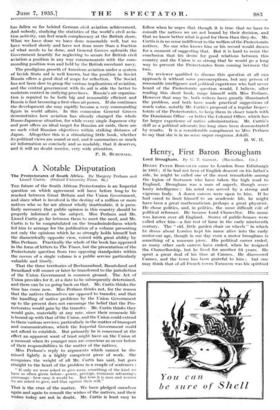A Notable Disputation
The Protectorates of South Africa. By Margery Perham and Lionel Curtis. (Oxford University Press. 6s.)
THE future ,of the South African Protectorates is an Imperial question on which agreement will have before long to be reached between Great Britain and the Union Government, and since what is involved is the destiny of a million or more natives who so far are almost wholly inarticulate, it is pecu- liarly necessary that public opinion in this country should be properly informed on the subject. Miss Perham and Mr. Lionel Curtis go far between them to meet the need, and Mr. Curtis is to be congratulated on the broadinindedness which led him to arrange for the publication of a volume presenting not only the opinions which he so strongly holds himself but the diametrically opposite view, voiced with great ability by Miss Perham. Practically the whole of the book has appeared in the form of letters to The Times, but the presentation of the Protectorate question from two opposing standpoints within the covers of a single volume is a public service particularly valuable and timely.
That the three territories of Bechuanaland, Basutoland and Swaziland will sooner or later be transferred to the jurisdiction of the Union Government is common ground. The Act of Union provides for it, at a date to be subsequently determined, and there can be no going back on that. Mr. Curtis thinks the time has come now. Miss Perham thinks not, for the reason that the natives themselves are opposed to transfer, and that the handling of native problems by the Union Government up to the present does not encourage the belief that the Pro- tectorates would gain by the transfer. Mr. Curtis thinks they would gain, materially at any rate, since their economic life is bound up with that of the Union, and the Union could extend to them various services, particularly in the matter of transport and communications, which the Imperial Government could not afford to establish. But primarily he is concerned at the effect an apparent want of trust might have on the Union at a. moment when its younger men are conscious as never before of their responsibilities in the matter of the natives.
Miss Perham's reply to arguments which cannot be dis- missed lightly is a highly competent piece of work. She recognizes the weight of all Mr. Curtis has said, but goes straight to the heart of the problem in a couple of sentences :
"If only we were asked to give away something of the kind we have so often given before—power, prestige, economic advantage, patronage—how easy it would be. But here it is men and women Wears asked to give, and that against their will."
That is the crux of the matter. We have pledged ourselves again and again to consult the wishes of the natives, and their wishes today are not in doubt. Mr. Curtis is least easy to follow when he urges that though it is true that we have to consult the natives we are not bound by their decision, and that we know better what is good for them than they do. Mr. Curtis is in no sense indifferent to the welfare of the Protectorate natives. No one who knows him or his record would dream for a moment of suggesting that. But it is hard to resist the conclusion that his desire for good relations between this country and the Union is so strong that he would go a long way to prevent the Protectorates from coming between the two.
No reviewer qualified to discuss this question at all can approach it without some preconceptions, but any person of reasonable intelligence and political experience who had never heard of the Protectorate question would, I believe, after reading this short book, range himself with Miss Perham. However that may be, both writers have greatly illuminated the problem, and both have made practical suggestions of much value, notably Mr. Curtis's proposal of a regular Inspec- torate of the Protectorates, to keep them in closer touch with the Dominions Office—or better the Colonial Office, which has far larger experience of native administration. Mr. Curtis's skill as a political advocate has long since been demonstrated by results. It is a considerable compliment to Miss Perham to say that she is in no sense impar con gressa Achilli.
H. W. H.










































 Previous page
Previous page